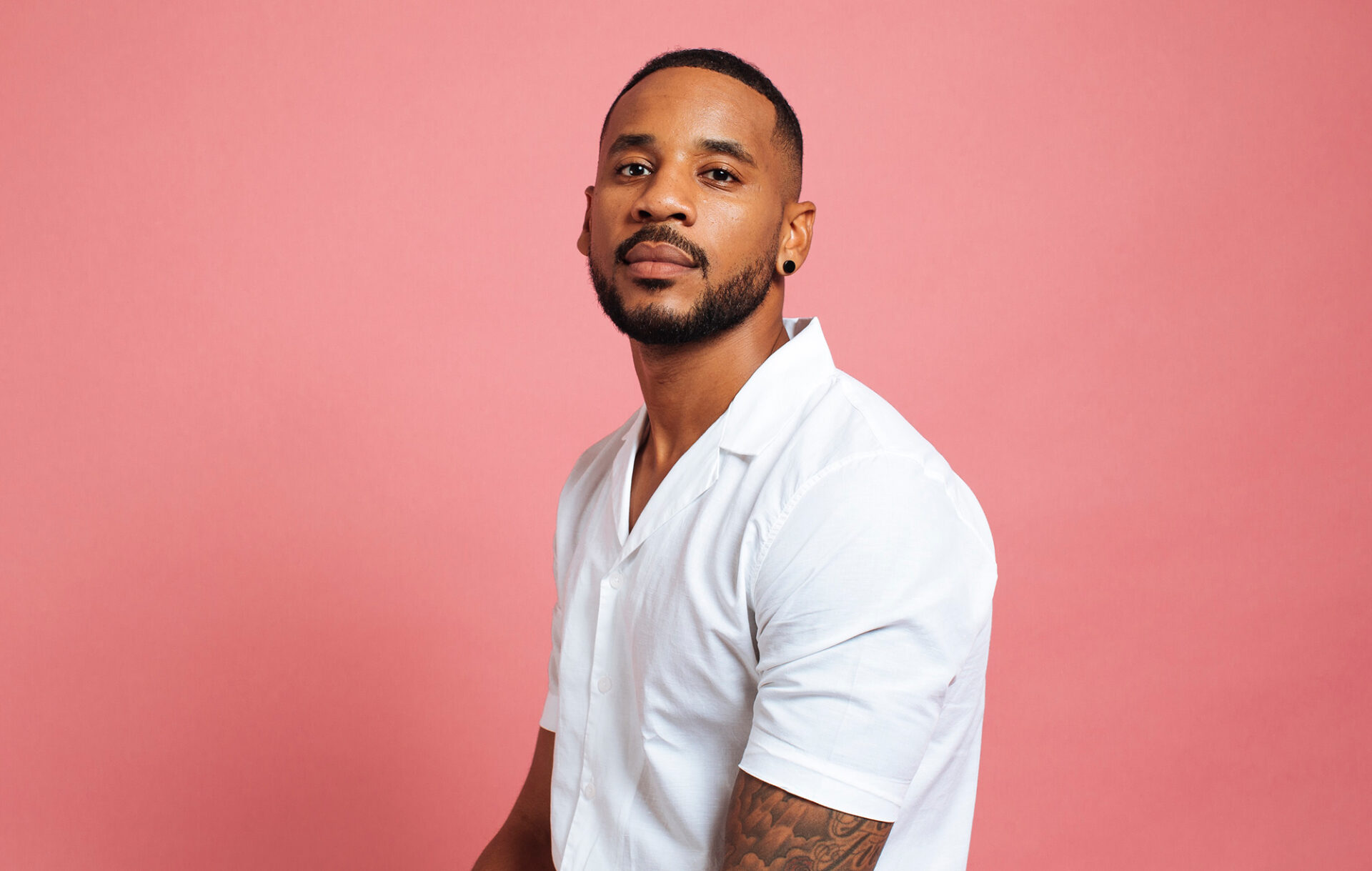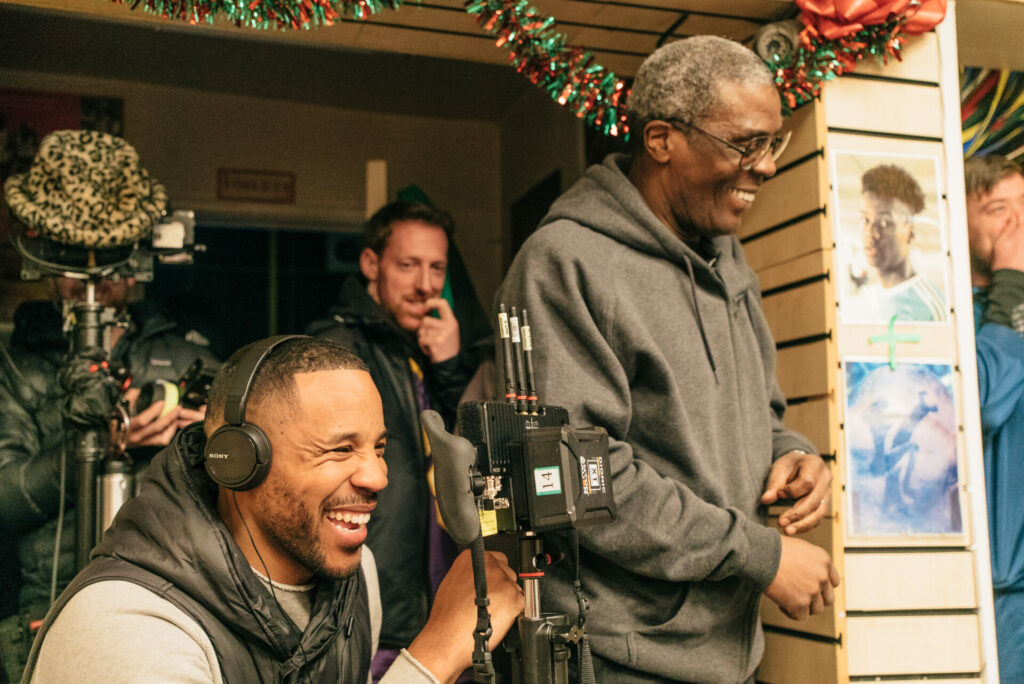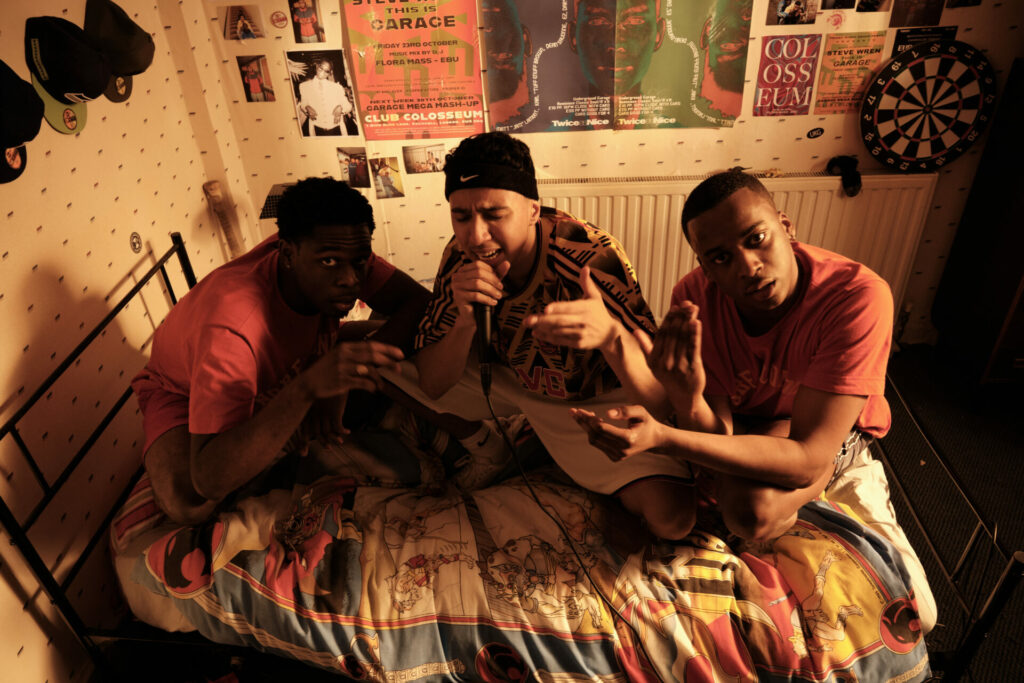“I was always the affable best friend to the white lead”: Reggie Yates on what inspired his first feature film, Pirates
The multi-hyphenate's debut film centres around three best mates who love UK Garage.
By Hannah Ewens

You know him from his rich, human-led documentaries or his warm voice from the radio – soon you’ll know Reggie Yates from the big screen. The London-born-and-bred journalist and presenter has short films in his repertoire but this might be the first time you pay a tenner to see the fruits of his creative labour.
Pirates is a joyous buddy comedy about three mates with a pirate radio station who just want to have the best New Year’s Eve of their lives. Unfortunately, Cappo (Elliot Edusah), Two Tonne (Jordan Peters) and Kidda (Reda Elzaouar) are having problems getting tickets to the hottest night in town. From the fashion to the soundtrack, the film is immersed in UK Garage culture. It’s the first proper period piece set in UKG London we’ve ever seen.
When we speak to Yates about his debut film, he’s content with the long day of press interviews ahead. “I’ve done so many interviews over the years, it’s refreshing to be promoting something that is 100 percent something I believe in and love and am excited of,” he grins.
Have you ever committed to work only to be disappointed by the result? Maybe it feels like something you can’t get behind?
Not so much in the latter stages of my presenting career because as time went on I was producing and steering those films so much more, whereas in the earlier stages I was just being put in a situation and told that this is how you should steer this. The days when I was promoting films I don’t care about are lifetimes ago now but they’re still burned as a really, really dark memory in my mind.
What made you want to write your own work?
I was writing from the age of nine, ten years old. I didn’t really know I was doing it. I’d sit down with my pal Danny and we’d create plays together. But we didn’t realise that was writing. I got older [and] as an actor, which was what I started out as, I found myself playing the same role again and again. I was always the affable best friend to the white lead and there was a point where I went for an audition and got the part and it was for a character called Nathan. It was the fourth Nathan that I’d played and he was essentially the same character.
I thought, ‘nah this doesn’t work for me’, and my desire to write went into overdrive. I can’t continue to do this, I have to create the things I wanted to see. Ultimately it took me a long time – I was juggling presenting, radio and acting – but I got there in the end. Quietly in hotel rooms, alongside that, I was writing scripts and they were crap. Eventually I started to sharing stuff with my team and the people who were repping me as an actor started repping me as a writer. I started making short films because I thought it was the only authentic and true way to test myself and see if I was any good. That was the proving ground. It was off the back of those, that I drew a line in the sand and said ‘Ok, I’m only writing features from now on.’
Is this the end of your documentary making?
I have no intention in doing any factual filmmaking for the foreseeable future. I’m not writing it off but I spent the best part of 10 years making over 40 films in one lane. At the moment my desire is not in telling stories with real people. I’ve pivoted in my career so many times but it’s not severing something off, it’s because I’ve stopped learning. When you’re operating on muscle memory, the work suffers.

Who in your childhood encouraged you to work so young? Did you ever have a mentor of any sort?
[laughs] Nah, I’m from a Ghanian family in North London – no one did anything like what I do. It was working four jobs and trying to keep the lights on, so what I was doing wasn’t real. It was a pipe dream. My mum just wanted me out of the house. I had too much energy, too many ideas and the block I lived on wasn’t the best and she didn’t want me playing outside so she sent me to a community drama group which had an incredible reputation in the area and it also happened to have an agency built on. Me and my sister would go twice a week to this community group for £2.50 a lesson and it changed my life. It was a place where I was able to use my energy in a positive way and wasn’t sucked into the madness going on where I grew up. As a result, I was a massive showoff, and got auditions and started acting from a very young age.
So, were you coming home as a child and saying, ‘Mum, I’ve got work’?
It was more than just mum and family, it was the block. It was this hilarious juxtaposition, obviously people are now way more ready to discuss race and class than ever before, and I’ve always been aware of them because from a very young age I was made aware I am different. I was the only Black kid on a set of white people. There was a multicultural environment on my estate but everyone was broke and everyone was the same. But when I went to set I was surrounded by people who lived a very different life. When I had a limousine picking me up or whatever, people were like, ‘woah’, that’s what made my mates on the estate be like, ‘what’s all this about?’.
People I grew up with started to put me in a different pocket because of the trappings of the world that I was now involved in. I was being treated differently by teachers, friends on the block… I didn’t particularly understand it but I recognised it at a young age. It wasn’t until later on in my teens when people started to take umbrage with [me] moving in a direction they can’t. That was when it started to become something else.

What was the writing process for Pirates like?
Because the idea was so indented in my mind, I wrote it in ten days in LA while I was making a BBC2 documentary called TV’s Black Renaissance about the Donald Glovers of this world, the Lena Waithes. I just extended my stay and wrote the first draft. On a practical level, there was way more music in the script that ended up in the movie because we couldn’t afford it, you’ve got to license these records and these were things I was learning. Right the way through to my desire to have more jokes and more sets and locations… in independent cinema there’s only so much you can do. Originally, there was a whole section of this film in Ayia Napa but we had to cut it. It was a learning curve working with amazing script editors and producers who helped me show me how to work with the budget.
You’ve got the characters singing a lot of the songs though, so it feels saturated with the culture of the era. Was that one of the ways you navigated the budget restrictions?
We had to strike a balance. We got maybe 60 percent of the songs I wanted in there and we filled the gaps with an amazing composer, a friend of mine, Kevin McPearson, who used to produce garage music back in the day so he still had all the sounds and he knew what to do. We sat down and created original music together that felt like it was from the era. We had to be careful about the music we did use too, “A Little Bit of Luck” for example, is a classic garage tune but we used it as score and chopped it up and used different bits in different scenes.
To what degree were you immersed in UKG growing up in North London?
It was huge, huge. We’ve been fortunate to have a lot of [music] subcultures here in the UK and for some reason this tiny little island has produced so much culture that has been absorbed globally. We’ve put on a pedestal punk and grime but we’ve not paid much attention to what UK Garage did. It was hugely important for me and a lot of other people in our formative years – in the clubs and driving around in our cars. It was made by people of a similar age and a similar background. It was special, we talked a certain way, dressed a certain way. We all went on holiday together to Ayia Napa. I’m sure people would argue about how long those golden years were but they were special and it’s lovely to be able to throw a time capsule around it and throw it into the world. It’s there forever now.
Your film feels part of UKG having a bit more visibility though in the last few years. The nostalgia of the pandemic mixed with events going on in London…
Yeah, definitely. I think a lot of people myself included were drawn to whatever felt joyful during the pandemic because we wanted to feel good and garage makes you feel good. It’s vocal-led, it’s about dancing, it’s about looking good and having fun. In the pandemic I was in my house DJing garage music for hours at a time, just because it was a way to get out of my head and have a little dance.
You don’t need to understand or remember the reference points to smile along with the film. I think when you capture something so nostalgic so well, you’re able to be in their world.
That’s essentially what we tried to achieve. Yes, there are wolf-whistles to people who were there but it’s a story about three friends and that’s universal. At the core of everything is a human story, as I said at the beginning of our conversation. You should be able to see yourself in those boys, riding around with your friends, thinking you know everything but you know fuck all. That’s why Quadrophenia has stood the test of time. You recognise that pack mentality of being a kid and wanting to belong.
‘Pirates’ is out in cinemas now.
